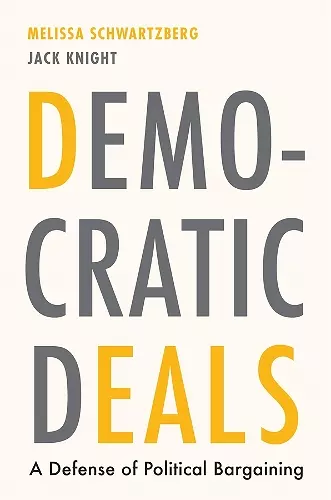Democratic Deals
A Defense of Political Bargaining
Melissa Schwartzberg author Jack Knight author
Format:Hardback
Publisher:Harvard University Press
Published:28th Jun '24
Should be back in stock very soon

Two leading scholars of democracy make the case for political bargaining and define its proper limits.
Bargains—grand and prosaic—are a central fact of political life. The distribution of bargaining power affects the design of constitutions, the construction of party coalitions, legislative outcomes, judicial opinions, and much more. But can political bargaining be justified in theory? If it inevitably involves asymmetric power, is it anything more than the exercise of sublimated force, emerging from and reifying inequalities?
In Democratic Deals, Melissa Schwartzberg and Jack Knight defend bargaining against those who champion deliberation or compromise, showing that, under the right conditions and constraints, it can secure political equality and protect fundamental interests. The challenge, then, is to ensure that these conditions prevail. Drawing a sustained analogy to the private law of contracts—in particular, its concepts of duress and unconscionability—the authors articulate a set of procedural and substantive constraints on the bargaining process and analyze the circumstances under which unequal bargaining power might be justified in a democratic context. Institutions, Schwartzberg and Knight argue, can facilitate gains from exchange while placing meaningful limits on the exercise of unequal power.
Democratic Deals examines frameworks of just bargaining in a range of contexts—constitution-making and legislative politics, among judges and administrative agencies, across branches of government, and between the state and private actors in the course of plea deals. Bargaining is an ineradicable fact of political life. Schwartzberg and Knight show that it can also be essential for democracy.
Much of democratic politics involves bargaining among unequally powerful people. How, then, can the results be legitimate? Melissa Schwartzberg and Jack Knight tackle this conundrum through the lens of contract law and its remedies for unconscionable agreements. Lucidly written with a minimum of jargon, Democratic Deals combines state-of-the-art democratic theory with a rich grasp of contract law and a refreshingly realistic standpoint. It is the best book on its subject and will be required reading for theorists and practitioners alike. -- Ian Shapiro, author of Uncommon Sense
Two of our best political theorists have made a major advance in our understanding of public law and politics. We have long known that contract analogies and bargaining theory help us to understand politics as it is, but Schwartzberg and Knight use them to develop a normative account and a vigorous defense of political bargaining in democracies. Rigorous, creative, and clear, Democratic Deals will be widely read in political science and law. -- Tom Ginsburg, author of Democracies and International Law
Schwartzberg and Knight brilliantly reveal how a democracy can achieve equitable treatment of interests. By clarifying the principles governing the institutions that regulate bargains, they demonstrate how to overcome the asymmetric power intrinsic to all societies. Their enlightening and finely argued analysis concludes with feasible proposals for electoral, judicial, and bureaucratic reforms that would have a transformative effect on our politics. -- Margaret Levi, coauthor of A Moral Political Economy
This landmark book integrates the normative concerns of democratic theory with the results of a half-century of empirical political science. Schwartzberg and Knight offer a holistic account of democratic political processes, from constitution-making to street-level bureaucracy, and argue convincingly for constrained bargaining as democracy’s fundamental mechanism. They show how equitable treatment of interests can ground democratic legitimacy and why institutional design belongs at the forefront of pragmatic political theory. The book is also a great read, engaging and clear, with well-chosen examples. Their policy recommendations are both bold and realistic. A must-read for political theorists and all serious students of American and comparative politics. -- Josiah Ober, coauthor of The Civic Bargain: How Democracy Survives
ISBN: 9780674279322
Dimensions: 235mm x 156mm x 17mm
Weight: 496g
272 pages